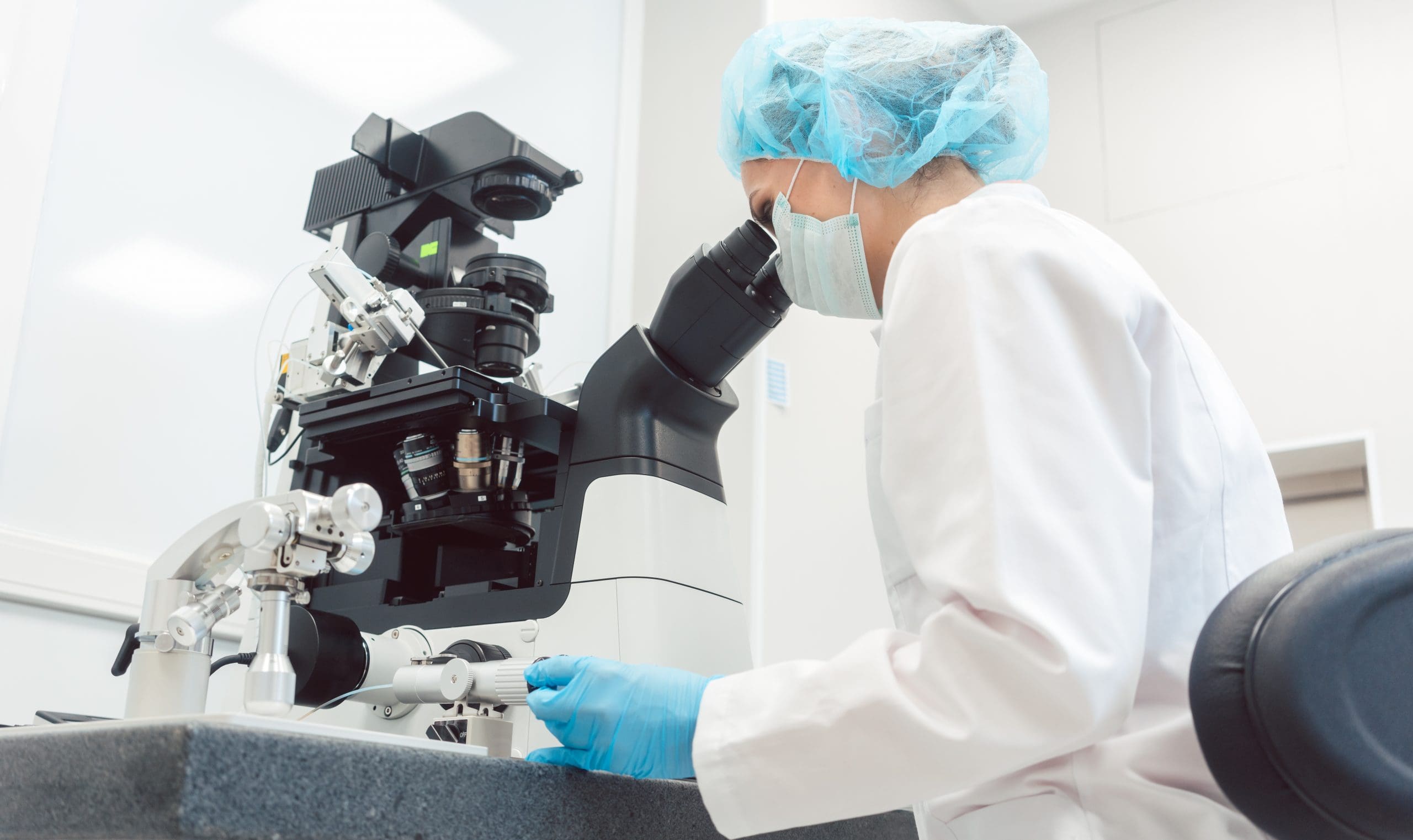What Is Surrogacy Treatment?
Surrogacy treatment allows more people than ever before the opportunity to start their fertility journey. Whether part of a same-sex couple, a solo parent, or a heterosexual couple with a history of fertility challenges, surrogacy allows patients to create a family where they might otherwise be unable to do so. Surrogacy uses a “surrogate” who carries the pregnancy on behalf of the intended parent(s), also known as IPs.
The Centre for Reproductive and Genetic Health has been helping patients create families through surrogacy for a number of years. In addition to specialist surrogacy coordinators, we have a dedicated team of nurses and counsellors who work alongside the consultant, IPs, and the surrogate to ensure the process is smooth and efficient. By recognising the unique opportunity that IVF surrogacy treatment can present, our dedicated team provides outstanding care to everyone involved in what can sometimes seem a complicated and daunting process.

How Does Surrogacy Treatment Work?
Consultation
First, a fertility consultant of your choice will sit down with you for a 60-minute appointment to discuss your medical history and goals. Your expert will also tell you more about the treatment types on offer and answer any questions you may have about our surrogacy fertility clinic or the process itself.
Blood tests and investigations
Your consultant will recommend some tests and fertility investigations to ensure you are ready for treatment. Depending on if you are a solo parent, same-sex couple, or heterosexual couple, various tests will be required. There are lots of additional tests which our doctors can also recommend should it be appropriate.
Finding your donor
Some patients will require donated eggs for their surrogate treatment, such as male solo parents or same-sex male couples. Finding donor eggs is easier than ever before with CRGH’s Ovumia partnership, helping to reduce donor waiting list times. Donors can either be “known” or “anonymous”, and our Donations Team will help you find the right anonymous donor if this is your chosen path.
Implications Counselling
For anyone undergoing fertility treatment using donated eggs, Implications Counselling is a mandatory part of the process. Our specialist fertility counsellors will help you understand what to consider when using donated eggs.
Follow up consultation
Once your test results are back you will meet with your consultant to discuss the results. Your consultant will also confirm a treatment plan based on these results during this meeting. Surrogacy treatment plans usually involve intended parents as well as donors.
Agree on your treatment plan
Before moving forward with any medication or surrogacy treatment, you will need to agree to the treatment plan and estimated costs, which our Patient Liaison Team will provide you with.
Nurse consultation
This meeting with one of our specialised fertility nurses marks the start of treatment itself. Your nurse will explain the different treatment steps and answer any other questions you might have. For those using donated eggs, the donor will also have a nurse consultation to ensure she has all the information needed to undergo stimulation and egg donation.
Stimulation
When the intended parent or the egg donor embarks on ovarian stimulation, you or your donor will undergo a course of medication and monitoring, which will help ensure the best possible results. During this period, you or the donor will have regular scans and blood tests to ensure the ovaries respond correctly, and any medication will be changed accordingly to ensure the best possible results.
Egg Collection
Having monitored the donor's blood and scan results closely throughout stimulation, your consultant will decide when is the optimal time for egg collection. Egg collection usually happens vaginally, under deep sedation in our theatre. Eggs can also be collected abdominally in certain circumstances. Once collected, healthy eggs are taken to our laboratory to be combined with sperm (usually that of the intended parent) and fertilised.
Embryo Development
Once fertilised, embryos typically develop for five days before freezing and transfer to the surrogate. During this time, our embryologists closely monitor how the embryos develop, indicating their quality. Our embryologists regularly communicate with you to update you on your embryos’ development.
Surrogate Search
Finding a surrogate in the UK and beyond can sometimes be tricky. So, with embryos safely in storage, our surrogacy coordinators can signpost you towards organisations which can assist in finding a surrogate for you. Many intended parents start this process alongside the steps outlined above. Alternatively, some intended parents take the opportunity to pause once they have created embryos before embarking on the next stage of the journey.
Legal Considerations
The surrogacy process requires legal advice before transferring an embryo to a surrogate. Your surrogacy coordinator or surrogate organisation will help you understand and complete these aspects.
Consultation
Both you and your surrogate will meet with your consultant to discuss how and when an embryo will be transferred. Your consultant will likely also recommend some investigations to ensure your surrogate can safely carry the pregnancy.
Surrogate Medication
Your surrogate will usually undergo some medication to prepare her body for the transfer and early pregnancy.
Embryo transfer
Your consultant and embryologist will help you to decide which embryo is the best to transfer for the highest possible chance of a healthy and successful pregnancy. Using a small, flexible tube, the chosen embryo will be implanted into the surrogate’s womb to continue its nine months of development as a completely natural pregnancy.
Pregnancy test
Fourteen days after the embryo transfer, your surrogate will take a pregnancy test, which will confirm the results of your treatment. Whatever the outcome, our team of consultants, nurses, and counsellors will be on hand to support you in your next steps.

Our Outstanding Success Rates
Live Birth Rate for PGS Treatment
2021, All Ages Average, Per Embryo Transferred
53.0%
Live Birth Rates for IVF/IMSI/ICSI/PIMSI Treatment
2021, All Ages Average, Per Embryo Transferred
35.4%
Frequently Asked Questions
The process of Surrogacy
How long does surrogacy take?
Surrogacy treatment can take more or less time, depending on various factors. For example, Intended Parents who find a surrogate mother and donor ready for treatment will be able to move forward much more quickly than those who need to find both a donor and a surrogate. Overall, we strive towards the most successful rather than the fastest procedure.
Is surrogacy suitable for everyone?
In the UK, not everyone is able to start a family using surrogacy. Your consultant will help explain who can and cannot start a family using surrogacy. Generally, surrogacy is an option for solo parents, same-sex male couples, and heterosexual couples with certain medical conditions which would prevent them from carrying the pregnancy themselves or a history of repetitive implantation failure or miscarriages.
Is surrogacy treatment safe?
Surrogacy is generally a very safe treatment, although there are some risks - particularly those usually associated with IVF. You can read more about the risks below, or visit the HFEA website which explains the risks for IVF and all other fertility treatments available in the UK.
How do I find a surrogate in the UK?
Our Donations Team will help you to find the right donor for you. We can also help you explore organisations which exist to help in finding a surrogate.
Can you pause during the surrogacy process?
Yes. One of the nice things about surrogacy treatment is you can “pause” at certain points in the process. For example, you can pause once you have created embryos while you search for the right surrogate. Speak to your consultant for more information on scheduling your treatment to suit your needs.
How much does surrogacy cost?
Surrogacy treatment costs vary depending on your individual needs, particularly regarding medication. You can find an example of the costs on our price list page.

